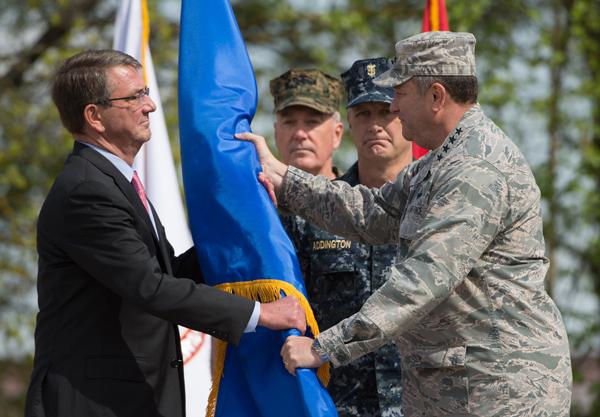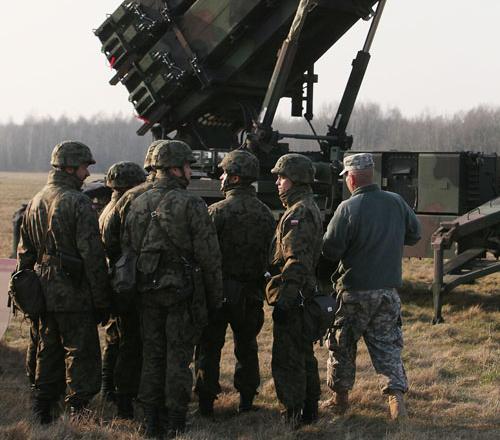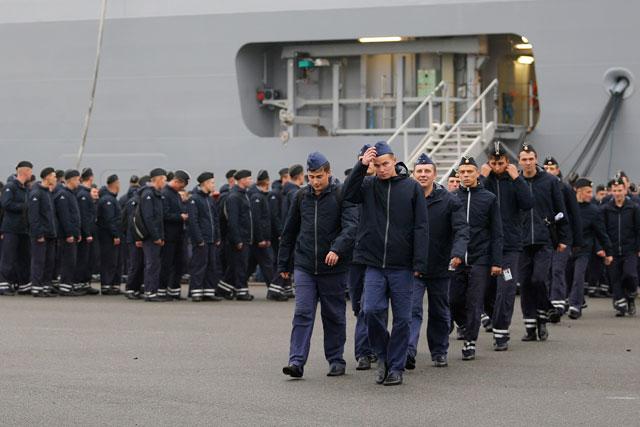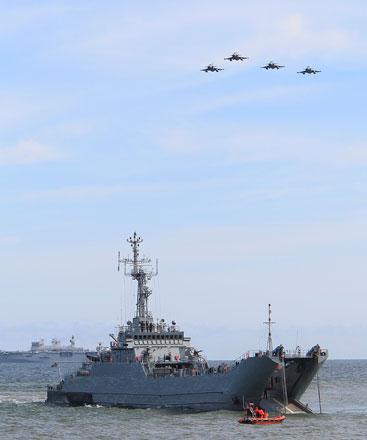You are here
Ash Carter accuses Russia of 'nuclear saber-rattling'
By AP - May 03,2016 - Last updated at May 03,2016

US Secretary of Defence Ashton Carter (left) receives the rank pennant from US Air Force General Philip Breedlove, the outgoing commanding officer of US and NATO troops in Europe, during the change in command at the United States European Command, in Stuttgart, Germany, on Tuesday (AP photo)
STUTTGART, Germany — Defence Secretary Ash Carter used a US military changing-of-the-guard ceremony Tuesday to blast Russian aggression in Europe, saying Moscow is "going backward in time" with warlike actions that compel a US military buildup on NATO's eastern flank.
"We do not seek a cold — let alone a hot — war with Russia," Carter said. "We do not seek to make Russia an enemy. But make no mistake, we will defend our allies, the rules-based international order, and the positive future it affords us."
Carter presided at a ceremony installing Army Gen. Curtis "Mike" Scaparrotti as head of US European Command and the top NATO commander in Europe. Scaparrotti most recently commanded US and allied troops in South Korea and has commanded troops in Afghanistan. He succeeds Air Force Gen. Philip Breedlove, who has pointedly and repeatedly warned that NATO must better prepare for an adversarial relationship with Russia.
Carter's remarks reflect US aggravation with Moscow on multiple fronts, including its intervention in eastern Ukraine, its annexation of Crimea in 2014 and what Carter called Russian efforts to intimidate its Baltic neighbours — which the United States is treaty-bound to defend because they are NATO members. "Most disturbing", Carter said, is loose talk by Russia about using nuclear weapons.
"Moscow's nuclear saber-rattling raises troubling questions about Russia's leaders' commitment to strategic stability, their respect for norms against the use of nuclear weapons, and whether they respect the profound caution that nuclear-age leaders showed with regard to brandishing nuclear weapons," he said.
The end of the Cold War, with the collapse of the Soviet Union in 1991, was thought to have virtually ended the prospect of nuclear conflict with Moscow. But the speeches at Tuesday's change-of-command ceremony emphasised the possibility of history repeating itself, or at least ending a period of warmer US-Russian relations.
Breedlove, who will retire after serving three years as NATO's top commander in Europe, recalled that he began his Air Force career in Europe more than 30 years ago.
"My career started here in a cold war trying to keep the peace. I think my career is now ending here trying to prevent a cold war and continue to keep the peace," he said.
Carter said he regretted the deterioration in relations with Moscow.
"We haven't had to prioritise deterrence on NATO's eastern flank for the past 25 years, but while I wish it were otherwise, now we have to," he said at an outdoor ceremony, speaking from a podium framed by birch trees and drenched in sunshine.
Carter outlined steps the Obama administration is taking to increase US and allied combat capabilities in Europe with the threat of Russian aggression in mind. These include plans to add a third US Army combat brigade in Europe in the coming year as part of a $3.4 billion initiative designed to further reassure allies of the US commitment to their security and to deter Russian aggression.
On Monday, Carter said NATO is considering establishing a continuous rotation of up to 4,000 troops in the Baltic states and possibly Poland. That force, which could include some number of US troops, is among options being discussed by NATO officials and is expected to be considered at a NATO defence meeting in June.
"Our budget also reflects how we're doing more, and in more ways, with specific NATO allies," Carter said. "Given increased Russian submarine activity in the North Atlantic, this includes building toward a continuous arc of highly capable maritime patrol aircraft operating over the Greenland-Iceland-United Kingdom gap up to Norway's North Cape."
Carter emphasised his hope that Russia will abandon what he called its confrontational approach.
"The United States will continue to hold out the possibility that Russia will assume the role of a constructive partner moving forward, not isolated and going backward in time as it appears to be today," he said. "Much of the progress we've made together since the end of the Cold War, we accomplished with Russia. Let me repeat that. Not in spite of Russia, not against Russia, not without Russia, but with it."
He made no mention of two post-Cold War developments that many believe prompted, at least in part, Russia's turn away from the West, namely, the expansion of NATO to Russia's very doorstep and US placement of missile defenses in Europe.
“We'll keep the door open for Russia,” he said. “But it's up to the Kremlin to decide.”
Related Articles
The West should consider using all its tools to help Ukraine, including sending defensive weapons, NATO's top military commander said on Sunday.
Russian forces are still operating in eastern Ukraine, providing the backbone of separatist rebels fighting the Kiev government, NATO's top military commander said on Wednesday after talks with Ukrainian leaders.
WARSAW — Battleships. Tanks. Helicopters.














